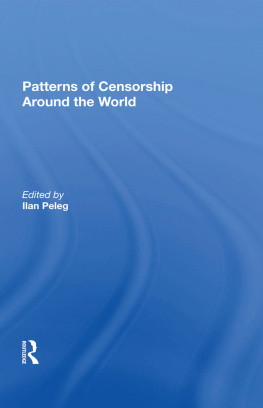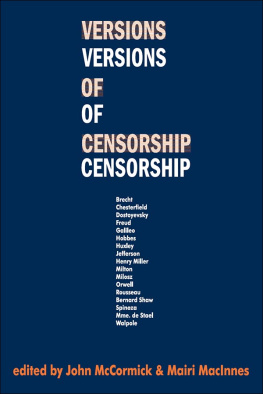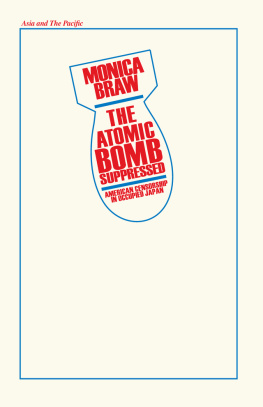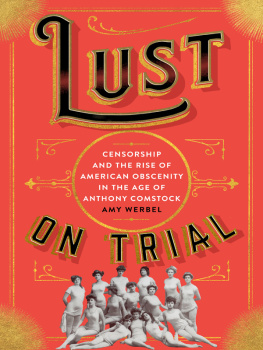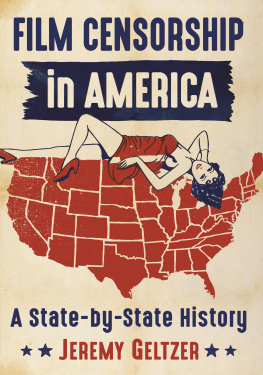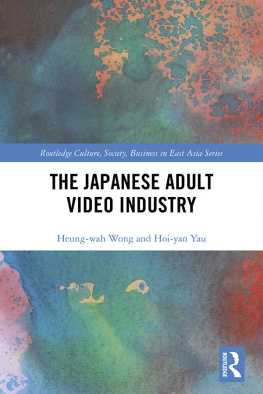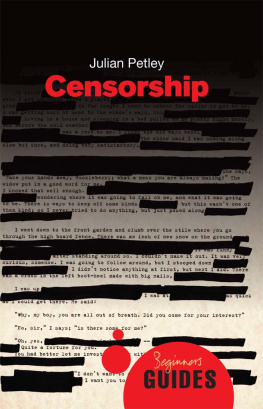
Censorship in Japan
This book explores censorship, particularly film and video censorship, in Japan in modern times. It shows how most censorship has been the film and video industry exercising self-censorship and how this system has been problematic in that it has allowed dominant players in the industry to impose their own standards and exclude independent filmmakers. It outlines notable obscenity cases and discusses how industry self-censorship bodies have been undermined both by industry outsiders setting up their own alternative regimes and by the industry self-censorship bodies themselves being prosecuted for obscenity. The book also examines the conflict between the obscenity law, introduced in Meiji times when Japan was importing Western models, and the freedom of speech law, which was put in place by the US occupation administration after World War II. The book concludes by assessing the current state of censorship in Japan and likely future developments.
Hoi-yan Yau is Senior Lecturer in the Department of Cultural Studies at Lingnan University, Hong Kong.
Heung-wah Wong is Associate Professor and Acting Head of the School of Modern Languages and Cultures at The University of Hong Kong.
Routledge Culture, Society, Business in East Asia Series
To view more titles in the series, follow this link: https://www.routledge.com/Routledge-Culture-Society-Business-in-East-Asia-Series/book-series/CSBEA
Editorial Board:
Heung Wah Wong (Executive Editor), The University of Hong Kong, Hong Kong, China
Chris Hutton, The University of Hong Kong, Hong Kong, China
Wayne Cristaudo, The University of Hong Kong, Hong Kong, China
Harumi Befu (Emeritus Professor), Stanford University, USA
Shao-dang Yan, Peking University, China
Andrew Stewart MacNaughton, Reitaku University, Japan
William Kelly, Independent Researcher
Keiji Maegawa, Tsukuba University, Japan
Kiyomitsu Yui, Kobe University, Japan
How and what are we to examine if we wish to understand the commonalities across East Asia without falling into the powerful fictions or homogeneities that dress its many constituencies? By the same measure, can East Asian homogeneities make sense in any way outside the biases of East-West personation?
For anthropologists familiar with the societies of East Asia, there is a rich diversity of work that can potentially be applied to address these questions within a comparative tradition grounded in the region as opposed the singularizing outward encounter. This requires us to broaden our scope of investigation to include all aspects of intra-regional life, trade, ideology, culture, and governance, while at the same time dedicating ourselves to a complete and holistic understanding of the exchange of identities that describe each community under investigation. An original and wide-ranging analysis will be the result, one that draws on the methods and theory of anthropology as it deepens our understanding of the interconnections, dependencies, and discordances within and among East Asia.
The book series includes three broad strands within and between which to critically examine the various insides and outsides of the region. The first is about the globalization of Japanese popular culture in East Asia, especially in greater China. The second strand presents comparative studies of major social institutions in Japan and China, such as family, community and other major concepts in Japanese and Chinese societies. The final strand puts forward cross-cultural studies of business in East Asia.
5 Gender, Dating and Violence in Urban China
Xiying Wang
6 Chinese Animation, Creative Industries Digital Culture
Weihua Wu
7 Japanese Encounters
The Structure and Dynamics of Cultural Frames
Eyal Ben-Ari
8 The Japanese Adult Video Industry
Heung-Wah Wong and Hoi-yan Yau
9 Tradition and Transformation in a Chinese Family Business
Heung Wah Wong and Karin Ling-fung Chau
10 Censorship in Japan
Hoi-yan Yau and Heung-wah Wong
Censorship in Japan
Hoi-yan Yau and Heung-wah Wong
First published 2021
by Routledge
2 Park Square, Milton Park, Abingdon, Oxon OX14 4RN
and by Routledge
52 Vanderbilt Avenue, New York, NY 10017
Routledge is an imprint of the Taylor & Francis Group, an informa business
2021 Hoi-yan Yau and Heung-wah Wong
The right of Hoi-yan Yau and Heung-wah to be identified as author of this work has been asserted by them in accordance with sections 77 and 78 of the Copyright, Designs and Patents Act 1988.
All rights reserved. No part of this book may be reprinted or reproduced or utilised in any form or by any electronic, mechanical, or other means, now known or hereafter invented, including photocopying and recording, or in any information storage or retrieval system, without permission in writing from the publishers.
Trademark notice : Product or corporate names may be trademarks or registered trademarks, and are used only for identification and explanation without intent to infringe.
British Library Cataloguing-in-Publication Data
A catalogue record for this book is available from the British Library
Library of Congress Cataloging-in-Publication Data
A catalog record has been requested for this book
ISBN: 978-1-138-22200-7 (hbk)
ISBN: 978-1-315-40906-1 (ebk)
Typeset in Times New Roman
by Deanta Global Publishing Services, Chennai, India
Contents
This book is the product of our decade-long research on Japanese adult videos. From the beginning, we intended it as the final volume that will complete our trilogy on adult videos, beginning with their recontextualisation in Taiwan, through their production system in the home country, and finally to their regulation and control as a form of disciplinary power. As we finish the trilogy, we have mixed feelings. It has been a huge focus of our academic life for years, and so letting it go is bittersweet, but we are also excited to do something different. Yet coming to the end of the trilogy made us aware of how much we are indebted to a great number of people for their support, assistance, and encouragement over the course of the years.
We are very grateful to Professor Eyal Ben-Ari, the well-known expert on Japanese Studies and Professor Emeritus of the Department of Sociology and Anthropology at the Hebrew University of Jerusalem, Israel, as well as to Professor Christopher Hutton, the all-round linguist and Professor of English, at the University of Hong Kong, for reviewing the manuscript, despite their busy schedule. Both made extremely valuable comments and suggestions for the book without which this book would not have been possible. We would also like to express our gratitude to Professor Wayne Cristaudo, who read the whole manuscript and provided insightful suggestions and criticisms, as always, and to Isaac Gagne, who copyedited the manuscript.
Gratitude is also due to many people in the Japanese AV industry: without their generous help, this book, in particular , could not have been written. They must be thanked for their patience in sitting with us for long hours and speaking to outsiders about their industry. One of the authors (Hoi-yan Yau) would also like to express her gratitude to the Faculty of Arts, Lingnan University, for providing generous funding which made her various research in Japan possible. The other author (Heung-wah Wong) would like to express his gratitude to Professor Kenichi Sudo, former Director General of the National Museum of Ethnology, Osaka, Japan, who provided him with an excellent environment in which to finish major parts of this book when Wong was attached there as a visiting professor from January 2016 to January 2017.


